If anyone had reason to celebrate this past New Year’s Eve, it was King Gizzard & the Lizard Wizard. On December 31, the Australian psych-rock collective finally fulfilled their long-standing promise to release five new albums in 2017, surreptitiously making Gumboot Soup available on their Bandcamp page hours before the year came to a close. Whether they were scrambling to make the deadline or were just withholding the new record until the last possible moment for dramatic effect, the photo finish felt just right for a wildly unpredictable band that always seems to be flying by the seat of its cut-off shorts, yet always manages to get the job done. The remarkable thing about King Gizzard’s 2017 isn’t just that they managed to release five records—it’s that not a moment of them felt half-assed. They didn’t cook the books by dropping a 30-minute improv jam or cobbling together a bunch of acoustic song sketches and calling it an album. Whether it was released by a big label like ATO, a small Aussie indie like Flightless, or, well, you, each of their 2017 releases is an elaborately constructed, carefully considered statement that opened up new universes for the band to explore.
A title like Gumboot Soup might suggest a sloppy collection of leftovers, but the record features some of the most delicately rendered songs ever released by this bull-in-a-china-shop band. In it, you’ll hear echoes of the band’s other 2017 releases—the ominous eco-conscious parables of Flying Microtonal Banana, the over-the-top motorik metal of Murder of the Universe, the jazzy looseness of Sketches of Brunswick East, the pastoral prog of Polygondwanaland. But there’s an emphasis on pop craftsmanship and concision here that greatly distinguishes it from its immediate predecessors (not to mention a gesture toward late-’70s Bowie-esque art-funk, via “Down the Sink,” that constitutes another new look for this stylistically promiscuous group).
Where the vocals in a given King Gizzard song tend to mimic the pattern of the main guitar riff or underlying rhythm (often encouraging mantric repetition), here, the arrangements rally around the melodies. Keyboardist Ambrose Kenny-Smith’s atypically relaxed voice leads the way on the gently swinging cocktail-lounge pop of “The Last Oasis,” gradually submerging the song in a blissful, aquatic whirl. And the dreamy, psychedelic soft-rock of “Beginner’s Luck” is so enchanting, you could be forgiven for thinking its scenes of high-stakes casino gambling constituted a celebration of excess, rather than a cautionary allegory for unchecked greed. (The spastic, squawking guitar solo that overtakes the song in its final minute brings the band’s subversive intent to the fore.)
